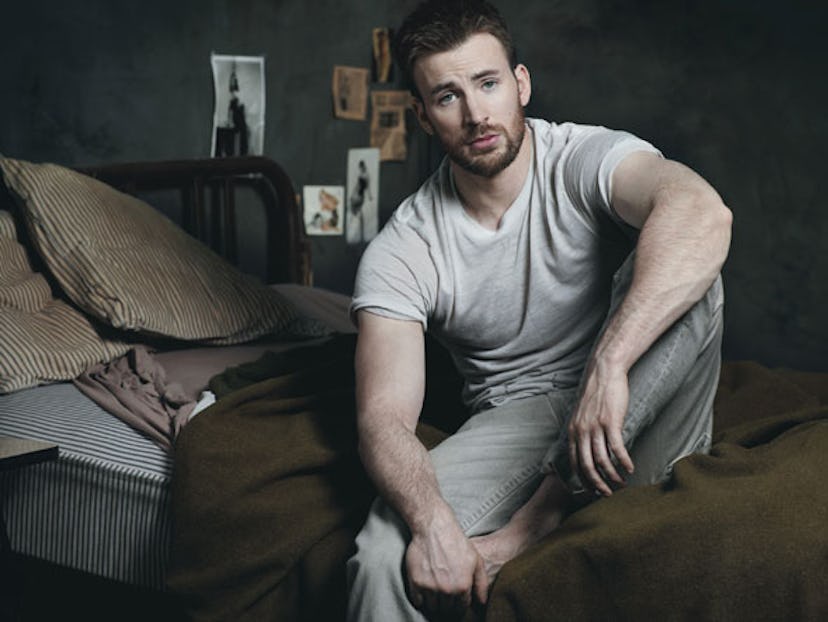Hero Complex

There is a scene halfway through The Iceman—the based-on-a-true-story movie about Richard Kuklinski, the most prolific, least conflicted hit man of all time—in which Chris Evans, who has become wildly successful in the role of squeaky-clean Captain America, chops up bodies with a giant cleaver. There are bloody limbs everywhere, and Evans, his boyish features obscured by a shaggy beard and long matted hair, is positively gleeful as Robert Pronge, the contract killer who assisted Kuklinski. Evans, 31, is a natural leading man, and although it would make sense for him to protect his superhero status, he is aggressively resistant to being typecast. “I was obsessed with the Iceman,” Evans told me over the phone from Los Angeles, where he is training for the next installment of Captain America (a series that includes Marvel’s the Avengers, Disney’s highest-grossing domestic film to date). “I’m attracted to that sociopathic stuff—the idea of no handcuffs on your personality. A thousand times a day I want to stand on my chair, kick over my water glass, and say what’s on my mind. But I don’t. Pronge did; he was the crazy mayor of his own island.”
Pronge, who sold ice cream when he wasn’t killing strangers for money, had the split personality that Evans finds attractive in the characters he portrays. What made Captain America compelling was the disparity between Steve Rogers, the real-life regular guy, and his crusading, muscle-bound alter ego. And yet when Evans was offered the part, which came with a multi-movie franchise commitment, he resisted—and even went into therapy. He was worried about being seen as a cartoon character for nine more films. Marvel Studios reduced the number to six, but Evans said no again. Finally, he realized that becoming an international star would not be the end of the world. “And if I hadn’t done the movie, I’d be kicking myself,” he said.
Evans grew up in Boston in a family of performers, and his mother still runs a youth theater. “We were like the von Trapps, all singing and dancing. I still sing everywhere—in the shower, in the car, before I got on the phone with you.” As a teen, he went to acting camp (“I was one of the few straight guys there; I realized early that the odds with girls were in my favor”), and at 18 he moved to Los Angeles after booking a pilot. He was cast almost immediately in the 2001 spoof Not Another Teen Movie and then opposite Scarlett Johansson in 2004’s The Perfect Score.
I discovered Evans when he appeared in 2005’s London. I was procrastinating and desperately searching for something to watch at 2 a.m., when I became riveted by a movie in which a couple—Evans and Jessica Biel (who were dating at the time)—are fighting at a party. Evans was seductive and hateful, a rare combination. “When people tell me, ‘I love London,’ I say, ‘You must have had a fucked-up relationship!’ ” Evans said. “I’ve had those arguments with women; I’ve said those things. Sadly, I related to that narcissistic drug addict!”
London did not have much of a release, but Evans doesn’t seem to care. “I’m a bit of a control freak,” he confessed. “And it’s easier to be a control freak on a smaller project. If I were a director, I would never hire me. I want to know about everything—from the music to the camera angle.” Which means, of course, that he wants to direct. “Maybe a musical,” he said, joking. “I was at the Oscars with my mother, and she was out of her mind with excitement. During the dance numbers she whispered to me, ‘You should be up there dancing.’ It was good to remember how cool this stuff can be and why I wanted to be here in the first place.”
Grooming by Jenn Streicher for Tom Ford at Starworks Artists. Set design by Thomas Thurnauer. Special thanks to Siren Studios. Digital technician: Ryan Galloway. Photography assistants: Phil Sanchez, Marc Tarlton. Fashion assistant: Romy Devack.